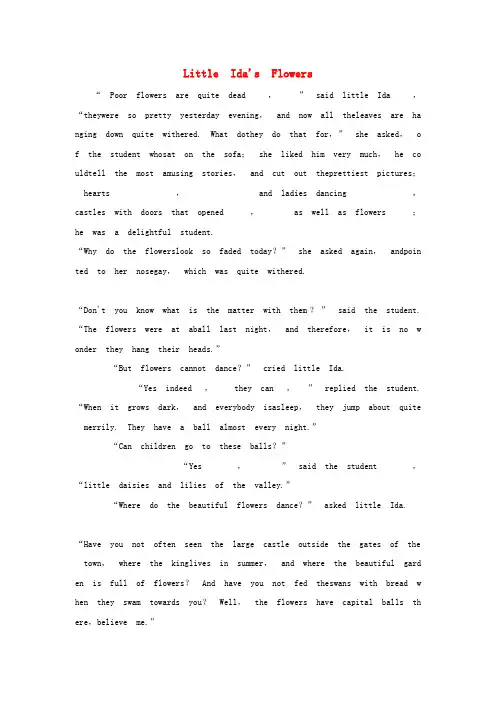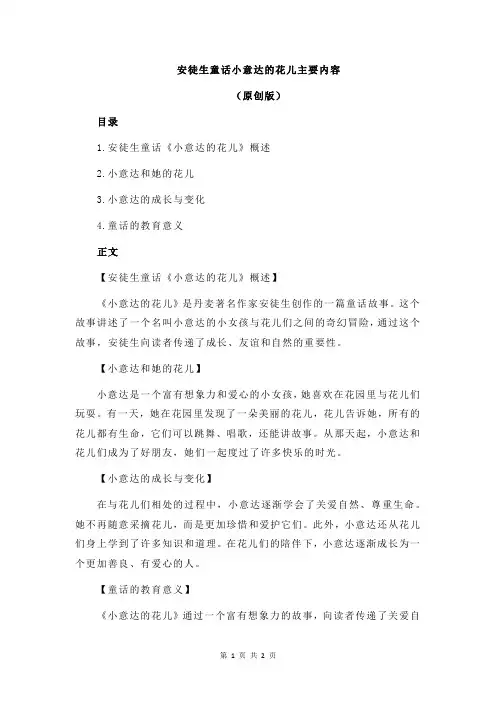安徒生童话:Little Ida's Flowers 小意达的花儿
- 格式:doc
- 大小:41.50 KB
- 文档页数:11

【安徒生童话】小意达的花儿从前有个小姑娘叫小意达,她特别喜欢花。
每天放学回家,她都会走花店的路过,看看窗台上的鲜花。
小意达就像一只小蜜蜂,唧唧喳喳地围着花儿转。
一天,小意达看到一朵特别美丽的小花。
它的花瓣白如雪,如同一颗颗棉絮。
小意达忍不住伸出小手,轻轻地触摸着花瓣。
奇妙的事情发生了,花瓣突然变成了几道光线,飞快地闪烁着。
小花变得非常高兴,它告诉小意达,只要她在白花旁边许愿,它就会帮助她实现愿望。
小意达十分开心,她环顾四周,发现很多人在花店的门口排队等候购买鲜花。
她突然想到了一个主意,她希望所有人都能拥有自己喜欢的花,感受花的美好。
于是,小意达开始了她的“小花愿望之旅”。
她每天放学后,都到花店门口静静地等待。
当终于轮到她时,她挑选了最美的一束花。
小意达把花带回家,将它仔细地放在一盆盆具里,轻轻地说:“小花啊,希望你能让更多的人开心。
”第二天,小意达拿着一盆美丽的玫瑰花来到学校。
她深情地将花递给同学们,大家惊喜地接过花,脸上露出了满足的笑容。
小意达开心地看着大家拿着花,像小蜜蜂一样欢快地活动着。
渐渐地,小意达成了一道美丽的风景线。
同学们看到她都会想起那些美丽的花。
每个人都能收到一束由小意达亲手选择的花,那是一份无尽的温暖。
小意达并没有停止她的愿望之旅。
她每天都会去花店,购买一束美丽的花。
有的时候,她会给老师一束鲜花,表达对老师的感谢之情;有的时候,她会给病人送上一束鲜花,希望他们早日康复。
小意达发现,每当她为别人送上花的时候,她自己也感到非常快乐。
花的美丽不仅能够点亮别人的生活,也能够点亮自己的心灵。
就这样,小意达过着快乐的日子,一束束鲜花陪伴着她成长。
她发现,每一束花都有自己的特点,每个人对花的感受也都不同。
有的人觉得玫瑰花美丽如画,有的人认为康乃馨温馨可爱,还有人钟爱郁金香的高贵。
小意达的花儿成了小镇上的一道亮丽的风景线,人们都夸赞小意达的善良和美丽。
她成了一个小小的花仙子,带来了大家对于美好的向往和幸福的感受。

安徒生童话中小意达的花儿的主要内容
摘要:
1.故事背景及主人公介绍
2.小意达的花儿的特点
3.小意达对花儿的照顾与关爱
4.花儿们的变化与成长
5.故事寓意与启示
正文:
安徒生童话中的《小意达的花儿》讲述了一个充满爱与关怀的故事。
故事发生在一个美丽的小镇上,主人公小意达是一个热爱生活、喜欢花儿的女孩。
故事中,小意达的花儿们具有各种各样的特点。
有的花儿美丽绚烂,有的花儿朴素无华,还有的花儿娇艳动人。
尽管它们各自不同,但小意达对每一朵花儿都充满关爱,细心照顾。
小意达每天都会给花儿们浇水、施肥、修剪枝叶,还会给它们讲温馨的故事。
在她的呵护下,花儿们逐渐发生了变化,从一棵棵平凡的小花成长为一株株婀娜多姿的花卉。
然而,有一天,小意达不得不离开家乡,去到一个遥远的地方。
在她离去之前,她将花儿们托付给了邻居奶奶照顾。
尽管花儿们离开了小意达,但它们仍然保持着美丽与活力,因为它们感受到了小意达的关爱与祝福。
通过这个故事,安徒生传达了爱与关怀的重要性。
正如小意达的花儿们一样,每个人都需要关爱与呵护,这样才能茁壮成长。

【安徒生童话】小意达的花儿从前,有一个小姑娘叫小意达,她住在一个叫花岗岩村的小村庄里。
花岗岩村是一个美丽而宁静的地方,村中有茂密的花园和五彩斑斓的花朵。
小意达是个善良而勤劳的姑娘,她每天都会早早起床,去花园里浇水和修剪花草。
她对花草的呵护有如母亲对待孩子般细心,每一朵花都被她细心照顾着。
有一天,小意达在花园里看到了一朵奇特的花儿,它的花瓣是五颜六色的,有红色、黄色、蓝色、绿色等各种颜色。
小意达觉得这朵花非常美丽,她决定给它起一个特别的名字——彩云花。
从那天起,小意达每天都会专门去照顾这朵彩云花。
她每天早晨都会去给它浇水,让它在阳光的照射下茁壮成长。
她还会给彩云花讲故事,唱歌给它听,彩云花就像是她的好朋友。
渐渐地,彩云花变得异常美丽和旺盛。
人们听说了小意达的花儿,纷纷来到花园里观赏。
彩云花的美丽让所有人陶醉人们惊叹于花的多彩和小意达的耐心。
有一天,花岗岩村的首领也听说了彩云花的美丽,他决定将这朵花带到皇宫,让国王也能欣赏到奇特的花儿。
首领来到了花园,看到了正盛开的彩云花。
他对小意达说:“小姑娘,你培育出了一朵非常特别的花儿,国王一定会喜欢的。
我愿意将彩云花带到皇宫去。
”小意达听后犹豫了一下,但她知道这样做可以让更多的人欣赏到花的美丽,于是她勇敢地答应了首领的请求。
首领将彩云花小心翼翼地放入了一个花盆中,然后带到了皇宫。
国王见到了彩云花,异常开心,他觉得这朵花非常美丽,是他一生中见过的最特别的花。
国王下令将彩云花种植在皇宫的花园里,并特意给它修建了一个精美的花坛。
彩云花在皇宫中茁壮成长,它的美丽和色彩让国王和皇宫的人们感到无比的幸福和骄傲。
而小意达依然住在花岗岩村,她想念着彩云花,但她知道自己为了让更多的人欣赏到花的美丽而做出了正确的选择。
多年后,花岗岩村被各地人们称为“花的村庄”。
每年的花博会上,人们都会带着自家的花儿参展。
而对于小意达来说,她最喜欢听到的是人们讲述彩云花的故事,她为自己的选择感到骄傲和幸福。

三一文库()〔安徒生童话故事:小意达的花儿〕“我的可怜的花儿都已经死了!”小意达说。
“昨天晚上他们还是那么美丽,现在他们的叶子却都垂下来了,枯萎了。
他们为什么要这样呢?”她问一个坐在沙发上的学生。
因为她很喜欢他。
他会讲一些非常美丽的故事,会剪出一些很有趣的图案:小姑娘在一颗心房里跳舞的图案、花朵的图案,还有门可以自动开启的一个大宫殿的图案。
他是一个快乐的学生。
“为什么花儿今天显得这样没有精神呢?”她又问,同时把一束已经枯萎了的花指给他看。
“你可知道他们做了什么事情!”学生问,“这些花儿昨夜去参加了一个跳舞会啦,因此他们今天把头垂下来了。
”“可是花儿并不会跳舞呀,”小意达说。
“嗨,他们可会跳啦,”学生说,“天一黑,我们去睡了以后,他们就兴高采烈地围着跳起来。
差不多每天晚上他们都有一个舞会。
”“小孩子可不可以去参加这个舞会呢?”“当然可以的,”学生说,“小小的雏菊和铃兰花都可以的。
”“这些顶美丽的花儿在什么地方跳舞呢?”小意达问。
“你到城门外的那座大宫殿里去过吗?国王在夏天就搬到那儿去住,那儿有最美丽的花园,里面有各种颜色的花。
你看到过那些天鹅吗?当你要抛给它们面包屑的时候,它们就向你游来。
美丽的舞会就是在那儿举行的,你相信我的话吧。
”“我昨天就和我的妈妈到那个花园里去过,”小意达说,“可是那儿树上的叶子全都落光了,而且一朵花儿都没有!它们到什么地方去了呀?我在夏天看到过那么多的花。
”“它们都搬进宫里去了呀,”学生说。
“你要知道,等到国王和他的臣仆们迁到城里去了以后,这些花儿就马上从花园跑进宫里去,在那儿欢乐地玩起来。
你应该看看它们的那副样儿才好。
那两朵顶美丽的玫瑰花自己坐上王位,做起花王和花后来。
所有的红鸡冠花都排在两边站着,弯着腰行礼,它们就是花王的侍从。
各种好看的花儿都来了,于是一个盛大的舞会就开始了。
蓝色的紫罗兰就是小小的海军学生,它们把风信子和番红花称为小姐,跟她们一起跳起舞来。
郁金香和高大的卷丹花就是老太太。

【安徒生童话】小意达的花儿
从前,有一个小女孩,叫做小意达。
她住在一个小村庄里,父母对她非常宠爱。
小意达非常喜欢花,她的庭院里开满了各种各样的鲜花。
她用心地照料每一朵花,使它们能够茁壮成长。
有一天,小意达发现她的一只小白兔不见了。
她四处寻找,最终在一丛花丛中找到了它,它已经死了。
小意达非常伤心,她想要为兔子举行一个葬礼,但是她不知道如何做。
她想,也许花儿会知道怎么做。
于是她问她那些美丽的鲜花,但是花儿都没有回答她。
小意达很失望,她问花儿们为什么不回答她。
花儿们告诉她,他们只会在春天和夏天开花,除此之外,他们什么也不知道。
小意达很失望,她不知道该怎么办。
她越来越感到孤单和无助。
然后,一个神奇的事情发生了。
小意达在花丛中发现了一朵她从来没有见过的花儿。
它非常美丽,它的花瓣如橙色的火焰一样美丽。
小意达决定问这朵花,是否知道如何为兔子举行一个葬礼。
花儿回答说,它可以帮助她,但是它需要三滴小意达眼泪的交换。
小意达很高兴,因为她知道这是她最宝贵的财富。
她开始哭泣,三滴泪水流落在花瓣上。
花儿开始变得明亮起来,它的花瓣发出耀眼的光芒。
小意达脸上的泪痕也消失了。
花儿告诉她,要为兔子铺上柔软的花瓣,并带来一朵最美丽的花作为小兔子的墓碑。
小意达照着这些做,小兔子得到了一个美丽的葬礼。
她的父母感到非常欣慰,因为他们知道她现在知道如何处理生命的变故。
从那时起,小意达变得更加坚强和自信,她知道如果她遇到任何问题,她可以相信她的内心和那些温柔的花儿。

Little Ida's Flowers“Poor flowers are quite dead,”said little Ida,“theywere so pretty yesterday evening,and now all theleaves are ha nging down quite withered. What dothey do that for,”she asked,o f the student whosat on the sofa;she liked him very much,he co uldtell the most amusing stories,and cut out theprettiest pictures;hearts,and ladies dancing,castles with doors that opened,as well as flowers;he was a delightful student.“Why do the flowerslook so faded today?”she asked again,andpoin ted to her nosegay,which was quite withered.“Don't you know what is the matter with them?”said the student. “The flowers were at aball last night,and therefore,it is no w onder they hang their heads.”“But flowers cannot dance?”cried little Ida.“Yes indeed,they can,”replied the student. “When it grows dark,and everybody isasleep,they jump about quite merrily. They have a ball almost every night.”“Can children go to these balls?”“Yes,”said the student,“little daisies and lilies of the valley.”“Where do the beautiful flowers dance?”asked little Ida.“Ha ve you not often seen the large castle outside the gates of the town,where the kinglives in summer,and where the beautiful gard en is full of flowers?And have you not fed theswans with bread w hen they swam towards you?Well,the flowers have capital balls th ere,believe me.”“I was in the garden out there yesterday with my mother,”said I da,“but all the leaveswere off the trees,and there was not a single flower left. Where are they?I used to see somany in the summer.”“they are in the castle,”replied the student. “You must know that as soon as the king andall the court are gone into the town,the flowers run out of the garden into the castle ,andyou should see how merry they are. The two most beautiful ros es seat themselves on thethrone,and are called the king and queen ,then all the red cocksbs range themselves oneach side,and bow,these are the lordsinwaiting. After that the pretty flowers e in,and there is a grand ball. The blue violets represent little naval cadets,and dance withhyacinths and crocuses which they call young l adies. The tulips and tigerlilies are the old ladieswho sit and watc h the dancing,so that everything may be conducted with order andpr opriety.”“But,”said little Ida,“is there no one there to hurt the flowers for dancing in the kin g'scastle?”“No one knows anything about it,”said the student. “The old steward of the castle,whohas to watch there at night,sometimes es in;but he carries a GREat bunch of keys,and as soon as the flowers hear the keys rattle,they run and hid e themselves behind the longcurtains,and stand quite still,just p eeping their heads out. Then the old steward says,'Ismell flowers here,' but he cannot see them.”“Oh how capital,”said little Ida,clapping her hands. “Should I be able to see theseflowers?”“Yes,”said the student,“mind you think of it the next time you go out,no doubt youwill see them,if you peep through the window. I did so today,and I saw a long yellow lilylying stretched out on the sofa. She was a court lady.”“Can the flowers from the Botanical Gardens go to these balls?”a sked Ida. “It is such adistance!”“Oh yes,”said the student “whenever they like,for they can fl y. Have you not seen thosebeautiful red,white. and yellow butterfli es,that look like flowers?They were flowers once.They have flown off their stalks into the air,and flap their leaves as if they were little wings tomake them fly. Then,if they behave well,th ey obtain permission to fly about during theday,instead of being o bliged to sit still on their stems at home,and so in time their leavesbee real wings. It may be,however,that the flowers in th e Botanical Gardens have neverbeen to the king's palace,and,there fore,they know nothing of the merry doings at night,which take place there. I will tell you what to do,and the botan ical professor,who lives closeby here,will be so surprised. You know him very well,do you not?Well,next time you gointo his garden,you must tell one of the flowers that there is going to b e a grand ball at thecastle,then that flower will tell all the o thers,and they will fly away to the castle as soon aspossible. An d when the professor walks into his garden,there will not be a s ingle flower left.How he will wonder what has bee of them!”“But how can one flower tell another?Flowers cannot speak?”“No,certainly not,”replied the student;“but they can make signs. Have you not oftenseen that when the win d blows they nod at one another,and rustle all their GREen leaves ”“Can the professor understand the signs?”asked Ida.“Yes,to be sure he can. He went one morning into his garden,a nd saw a stinging nettlemaking signs with its leaves to a beautiful red carnation. It was saying,'You are so pretty,Ilike you very much.' But the professor did not approve of such nonsense,so he clapped hishands on the nettle to stop it. Then the leaves,which are its fingers,stung him so sharplythat he has never ventured t o touch a nettle since.”“Oh how funny!”said Ida,and she laughed.“How can anyone put such notions into a child's head?”said a ti resome lawyer,who hade to pay a visit,and sat on the sofa. He did not like the student,and would grumblewhen he saw him cuttin g out droll or amusing pictures. Sometimes it would be a man hangin gon a gibbet and holding a heart in his hand as if he had been s tealing hearts. Sometimes it wasan old witch riding through the air on a broom and carrying her husband on her nose. But thelawyer did not like such jokes,and he would say as he had just said,“How can anyone putsuch nonsense into a child's head!what absurd fancies there are!”But to little Ida, all these stories which the student told her about the flowers, seemed very droll, and she thought over them a GREat deal. The flowers did hang their heads, because they had been dancing all night, and were very tired,and most likely they were ill. Then she took them into the room where a number of toys lay on a pretty little table, and the whole of the table drawer besides wasfull of beautiful things. Her doll Sophy lay in the doll's bed asleep, and little Ida said to her,“You must really get up Sophy, and be content to lie in the drawer tonight; the poor flowers are ill, and they must lie in your bed, then perhaps they will get well again.” So she took the doll out, who looked quite cross, and said not a single word, for she was angry at being turned out of her bed. Ida placed the flowers in the doll's bed, and drew the quilt over them. Then she told them to lie quite still and be good, while she made some tea for them, so that they might be quite well and able to get up the next morning. And she drew the curtains close round the little bed, so that the sun might not shine in their eyes. During the whole evening she could not help thinking of what the student had told her. And before she went to bed herself, she was obliged to peep behind the curtains into the garden where all her mother's beautiful flowers grew, hyacinths and tulips,and many others. Then she whispered to them quite softly,“I know you are going to a ball tonight.” But the flowers appeared as if they did not understand, and not a leaf moved; still Ida felt quite sure she knew all about it. She lay awake a long time after she was in bed, thinking how pretty it must be to see all the beautiful flowers dancing in the king's garden. “I wonder if my flowers have really been there,” she said to herself, and then she fell asleep. In the night she awoke;she had been dreaming of the flowers and of the student, as well as of the tiresome lawyer who found fault with him. It was quite still in Ida's bedroom; the nightlamp burnt on the table,and her father and mother were asleep. “I wonder if my flowers are still lying in Sophy's bed,” she thought to herself;“how much I should like to know.” She raised herself a little, and glanced at the door of the room where all her flowers and playthings lay; it was partly open, and as she listened, it seemed as if some one in the room was playing the piano, but softly and more prettily than she had ever before heard it. “Now all the flower s are certainly dancing in there,” she thought,“oh how much I should like to see them,” but she did not dare move for fear of disturbing her father and mother. “If they would only e in here,” she thought; but they did not e, and the music continued to play so beautifully, and was so pretty, that she could resist no longer. She crept outof her little bed, went softly to the door and looked into the room. Oh what a splendid sight there was to be sure! There was no nightlamp burning, but the room appeared quite light, for the moon shone through the window upon the floor, and made it almost like day. All the hyacinths and tulips stood in two long rows down the room,not a single flower remained in the window, and the flowerpots were all empty. The flowers were dancing gracefully on the floor, making turns and holding each other by their long green leaves as they swung round. At the piano sat a large yellow lily which little Ida was sure she had seen in the summer, for she remembered the student saying she was very much like Miss Lina, one of Ida's friends. They all laughed at him then, but now it seemed to little Ida as if the tall, yellow flower was really like the young lady. She had just the same manners while playing, bending her long yellow face from side to side, and nodding in time to the beautiful music. Then she saw a large purple crocus jump into the middle of the table where the playthings stood, go up to the doll's bedstead and draw back the curtains; there lay the sick flowers, but they got up directly, and nodded to the others as a sign that they wished to dance with them. The old rough doll, with the broken mouth,stood up and bowed to the pretty flowers. They did not look ill at all now, but jumped about and were very merry, yet none of them noticed little Ida. Presently it seemed as if something fell from the table. Ida looked that way, and saw a slight carnival rod jumping down among the flowers as if it belonged to them; it was,however, very smooth and neat, and a little wax doll with a broad brimmed hat on her head, like the one worn by the lawyer, sat upon it. The carnival rod hopped about among the flowers on its three red stilted feet, and stamped quite loud when it danced the Mazurka; the flowers could not perform this dance, they were too light to stamp in that manner. All at once the wax doll which rode on the carnival rod seemed to grow larger and taller, and it turned round and said to the paper flowers,“How can you put such things in a child's head? they are all foolish fancies;” and th en the doll was exactly like the lawyer with the broad brimmed hat, and looked as yellow and as cross as he did; but the paper dolls struck him on his thin legs, and he shrunk up again and became quite a little wax doll. Thiswas very amusing, and Ida could not help laughing. The carnival rod went on dancing,and the lawyer was obliged to dance also. It was no use, he might make himself great and tall, or remain a little wax doll with a large black hat; still he must dance. Then at last the other flowers interceded for him, especially those who had lain in the doll's bed, and the carnival rod gave up his dancing. At the same moment a loud knocking was heard in the drawer, where Ida's doll Sophy lay with many other toys. Then the rough doll ran to the end of the table, laid himself flat down upon it, and began to pull the drawer out a little way.then Sophy raised himself, and looked round quite astonished,“There must be a ball here tonight,” said Sophy. “Why did not somebody tell me?”“Will you dance with me?” said the rough doll.“You are the right sort to dance with, certainly,” said she, turning her back upon him.then she seated herself on the edge of the drawer, and thought that perhaps one of the flowers would ask her to dance; but none of them came. Then she coughed,“Hem, hem, ahem;” but for all that not one came. The shabby doll now danced quite alone, and not very badly, after all. As none of the flowers seemed to notice Sophy, she let herself down from the drawer to the floor, so as to make a very GREat noise. All the flowers came round her directly, and asked if she had hurt herself, especially those who had lain in her bed. But she was not hurt at all,and Ida's flowers thanked her for the use of the nice bed, and were very kind to her. They led her into the middle of the room, where the moon shone, and danced with her, while all the other flowers formed a circle round them. Then Sophy was very happy, and said they might keep her bed; she did not mind lying in the drawer at all. But the flowers thanked her very much, and said,—“We cannot live long. Tomorrow morning we shall be quite dead; and you must tell little Ida to bury us in the garden, near to the grave of the canary;then, in the summer we shall wake up and be more beautiful tha n ever.”“No, you must not die,” said Sophy, as she kissed the flowers.then the door of the room opened, and a number of beautiful flowers danced in. Ida could not imagine where they could e from, unless they were the flowers from the king's garden. First came two lovely roses, with little golden crowns on their heads; these were the king and queen. Beautiful stocks and carnations followed, bowing to every one present. They had also music with them. Large poppies and peonies had peashells for instruments, and blew into them till they were quite red in the face. The bunches of blue hyacinths and the little white snowdrops jingled their belllike flowers, as if they were real bells. Then came many more flowers:blue violets, purple heart'sease, daisies, and lilies of the valley, and they all danced together, and kissed each other. It was very beautiful to behold.At last the flowers wished each other goodnight. Then little Ida crept back into her bed again, and dreamt of all she had seen. When she arose the next morning,she went quickly to the little table, to see if the flowers were still there. She drew aside the curtains of the little bed. There they all lay, but quite faded;much more so than the day before. Sophy was lying in the drawer where Ida had placed her; but she looked very sleepy.“Do you remember what the flowers told you to say to me?” said little Ida. But Sophy looked quite stupid, and said not a single word.“You are not kind at all,” said Ida;“and yet they all danced with you.”then she took a little paper box, on which were painted beautiful birds,and laid the dead flowers in it.“This shall be your pretty coffin,” she said;“and by and by, when my cousins e to visit me, they shall help me to bury you out in the garden; so that next summer you may grow up again more beautiful than ever.”Her cousins were two goodtempered boys, whose names were James and Adolphus. their father had given them each a bow and arrow, and they had brought them to show Ida. She told them about the poor flowers which were dead; and as soon as they obtained permission, they went with her to bury them. The two boys walked first,with their crossbows on their shoulders, and little Ida followed, carrying the pretty box containing the dead flowers. They dug a little grave in the garden. Idakissed her flowers and then laid them, with the box, in the earth. James and Adolphus then fired their crossbows over the grave, as they had neither guns nor cannons.。

【安徒生童话】小意达的花儿从前有一个小女孩叫小意达,她住在山坡上的一座小房子里,她非常爱美,喜欢收集各种花儿。
每天清早,小意达都会到山上采摘鲜花,她认为山上的花朵最为美丽动人。
小意达有一间小小的花房,她会将采摘到的鲜花插在花瓶里,每天都会换一种颜色的花。
小意达觉得这样一来,花房里就像一座五彩斑斓的花园,她非常喜欢。
有一天,小意达发现了山上有一种她从未见过的花儿,这种花儿生长在悬崖边上,花瓣呈现出五种颜色,非常美丽。
小意达非常想要这种花,她决定要去采摘一些回来。
但是山上的悬崖陡峭,很难攀爬,小意达不敢轻举妄动。
这天,小意达遇到了一位魔法仙子,她告诉仙子自己有一个特别的愿望,想要得到山上悬崖上的那种奇特花儿。
仙子听到小意达的愿望,笑了笑,说:“小朋友,你要得到那种花儿并不难,但你要答应我一个条件。
”小意达连忙点头,她非常渴望得到那种花儿,愿意答应任何条件。
仙子说:“我可以帮你得到那种花儿,但你要为这种花儿照顾一生一世,无论它生长在哪里,都要守护它、呵护它,就像自己的孩子一样。
”小意达听了仙子的条件,没有丝毫犹豫,她激动地答应下来。
仙子对小意达神秘地微笑着,然后消失在了空气中。
次日清晨,小意达收到了一束从未见过的花,这正是她在山上看到的那种奇特的花儿。
小意达非常高兴,她将这束花儿放在花房里,又赶紧到山上看望那些花儿生长的地方。
她答应过的仙子,她要从此一生一世地关爱这些花儿,就像自己的孩子一样。
随着时间的推移,小意达的花房里,那束奇特的花儿绽放出了绚丽的花朵,散发出缤纷的香味。
这种花儿生机勃勃,养护起来也并不困难,小意达非常珍惜它,每天都给它施肥、浇水、修剪,将它照顾得非常好。
不知不觉间,小意达成了一个邋遢的姑娘,她的脸上渐渐布满了皱纹,头发慢慢地变得花白,但是她的花房里的花依旧光彩照人,非常美丽动人。
小意达知道,这一切都是因为她对那束奇特花儿的关爱和呵护。
有一天,小意达感到自己已经筋疲力尽,她的眼睛也变得朦胧,她担心自己再也无法照顾那束花儿了。

安徒生童话小意达的花儿主要内容
(原创版)
目录
1.安徒生童话《小意达的花儿》概述
2.小意达和她的花儿
3.小意达的成长与变化
4.童话的教育意义
正文
【安徒生童话《小意达的花儿》概述】
《小意达的花儿》是丹麦著名作家安徒生创作的一篇童话故事。
这个故事讲述了一个名叫小意达的小女孩与花儿们之间的奇幻冒险,通过这个故事,安徒生向读者传递了成长、友谊和自然的重要性。
【小意达和她的花儿】
小意达是一个富有想象力和爱心的小女孩,她喜欢在花园里与花儿们玩耍。
有一天,她在花园里发现了一朵美丽的花儿,花儿告诉她,所有的花儿都有生命,它们可以跳舞、唱歌,还能讲故事。
从那天起,小意达和花儿们成为了好朋友,她们一起度过了许多快乐的时光。
【小意达的成长与变化】
在与花儿们相处的过程中,小意达逐渐学会了关爱自然、尊重生命。
她不再随意采摘花儿,而是更加珍惜和爱护它们。
此外,小意达还从花儿们身上学到了许多知识和道理。
在花儿们的陪伴下,小意达逐渐成长为一个更加善良、有爱心的人。
【童话的教育意义】
《小意达的花儿》通过一个富有想象力的故事,向读者传递了关爱自
然、尊重生命的道理。
故事告诉我们,人类应该珍惜大自然,保护环境,与自然和谐共处。
同时,这个故事也展示了友谊的力量,鼓励读者学会关爱他人,珍惜身边的朋友。

安徒生童话中小意达的花儿的主要内容小意达的花儿是安徒生童话中一个富有想象力和情感的故事。
它讲述了一个叫小意达的女孩和她的花朋友们之间的温馨互动。
在这个故事中,小意达通过与花朋友们的交流和相互帮助,展现了友谊、善良和关爱的重要性。
在这个童话故事中,小意达是一个热爱大自然的可爱女孩。
她喜欢在花园里和各种花朋友们玩耍,她不仅能和花朋友们交谈,还能听到他们的悄悄话。
小意达和她的花朋友们之间建立了一种特殊的联系,他们互相分享自己的快乐和困扰,互相支持和关心。
故事中,小意达的花朋友们是具备人性化特征的花朵,它们有自己的性格和情感。
每一朵花都有独特的故事和个性,它们代表了不同的情感和价值观。
在小意达的花园里,有傲慢自大的玫瑰、忧虑和不安的铃兰、善良和无私的百合等等。
通过这些花朋友们的描绘,安徒生告诉我们,每朵花都有独特的美和价值,我们应该关心和尊重每一朵花,就像我们对待其他人一样。
通过描述花朋友们之间的互动和小意达的心声,安徒生向我们展示了友谊、善良和关爱的温暖力量。
在这个故事中,小意达对花朋友们的关心和帮助,让每一朵花都感受到了被爱和被重视的温暖。
这告诉了我们要善待他人,尤其是那些看似脆弱无助的存在,因为每个人都渴望被理解和关怀。
除了友谊和关爱的主题,小意达的花儿还给我们带来了对自然的赞美和对美的热爱。
在小意达眼中,每一朵花都是独一无二的艺术品,它们以各种各样的色彩和形态向我们展示着大自然的奇妙和美丽。
安徒生通过小意达的眼睛,呼吁我们要珍惜和保护自然,尊重和欣赏其中的每一个细节。
我个人对小意达的花儿这个主题有如下的观点和理解。
这个故事告诉我们,友谊和关爱是人与人之间最美好的情感。
无论是与我们的亲人、朋友还是与自然界的万物相处,我们都应该用心去关心和理解他们,用真诚和善意去对待他们。
这样才能创造出一个温暖和谐的环境,让他人感受到我们的关爱和支持。
在我的文章中,我以从简到繁、由浅入深的方式探讨了小意达的花儿这个主题。

安徒生童话小意达的花儿内容《小意达的花儿》是安徒生童话中一篇寓言故事,讲述了一个小姑娘小意达的奇幻冒险之旅。
以下是根据这个故事内容所编写的一篇中文文章。
在一个美丽的村庄里,住着一位小姑娘叫小意达。
小意达是一个聪明机智的女孩,她有一头乌黑亮丽的长发,双眸明亮有神。
她热爱大自然,尤其喜欢花儿。
每当她在花田中漫步时,她总能发现一些别人看不见的美丽之处。
有一天,小意达在花丛中发现了一朵特别的花。
这朵花非常奇特,花瓣上镶嵌着五彩斑斓的宝石,闪烁着奇异的光芒。
小意达抱着好奇心,轻轻触摸了一下花瓣,并咬了一口花蕊。
就在这一瞬间,小意达被一股神秘的力量卷入了一个未知的世界。
当小意达重新睁开眼睛时,她发现自己身处在一个奇幻的花园里。
这个花园里长满了各种各样的花朵,红的、黄的、蓝的、紫的,五彩缤纷,美轮美奂。
小意达被这般美景所深深吸引,她开始探索这个未知的世界。
随着她的探索,小意达发现了花园里的每朵花都是特别的。
她遇到了一朵聪明的蓝花,这朵花能倾听人们的心声,并给予他们智慧和勇气。
小意达向蓝花讲述了自己的遭遇,蓝花鼓励她勇敢面对困难,寻找回家的方法。
在继续探索的过程中,小意达遇到了一朵温柔的粉红花。
这朵花会传递爱与关怀,小意达抱着这朵花,她能感受到温暖和安心。
粉红花告诉小意达,只要她相信自己,有爱与关爱,她就能战胜一切困难。
接下来,小意达遇到了一朵阳光般明亮的黄花。
这朵花拥有无限的希望和快乐,能够点亮黑暗。
黄花告诉小意达,无论遇到什么困境,只要她保持积极的态度,相信一切都会好起来。
在花园的深处,小意达发现了一朵特别的玫瑰花。
这朵花是花园的镇花,它有着无比强大的力量。
小意达走过去,小心翼翼地摘下一片玫瑰花瓣,放在手心中。
突然,她感受到了一股无比强大的力量在体内涌动,她觉得自己可以做到任何事情。
小意达用这片玫瑰花瓣向花园中的每一朵花致意。
蓝花、粉红花、黄花和玫瑰花都向小意达展示了它们所代表的价值和力量。
在花园中度过的时光让小意达变得更加勇敢、温柔、积极和强大。

安徒生童话小意达的花儿主要内容
摘要:
一、安徒生童话简介
二、小意达的花儿故事背景及角色介绍
三、小意达的花儿主要内容
四、故事寓意及启示
正文:
安徒生童话是丹麦作家汉斯·克里斯蒂安·安徒生创作的童话故事,他的童话作品闻名世界,对后世作家产生了深远的影响。
其中,《小意达的花儿》是安徒生的一部经典作品,讲述了一个充满想象力和温情的故事。
故事发生在一个小男孩小意达的身上,他十分喜爱花儿,并用心照顾着自己的花儿。
有一天,小意达发现自己的花儿在夜晚绽放得更加美丽,他忍不住想象花儿们在夜间举行的一场神秘舞会。
小意达的花儿们在舞会上尽情地跳舞,展现了它们的美丽和活力。
但第二天早晨,花儿们却都枯萎了,小意达十分伤心。
在小意达的花儿这个故事中,花儿们象征着生命和美丽。
它们不惜身体,追求美丽,直至生命的最后一刻。
故事通过花儿们的舞会,传达了生命虽然短暂,但我们应该珍惜每一个时刻,充分发挥自己的价值,追求美好的生活。
通过这个故事,我们可以得到启示:生活中,我们应当珍惜每一个美好瞬间,用心去体验生活,让自己的生命更加充实和有意义。
同时,我们还要学会珍惜生命,尊重每一个生命,无论它们是短暂的还是漫长的。
安徒生童话小意达的花儿主要内容
安徒生童话《小意达的花儿》主要讲述了一个温暖而感人的故事。
小意达是一个聪明乖巧的女孩,她住在一个陌生的城市里。
这个城市的人们都很忙碌,没有时间去欣赏花草的美丽。
然而,小意达却非常喜欢花儿。
她每天放学回家的路上,总会在花坛前驻足片刻,观赏花儿的绽放。
她喜欢触摸花瓣的柔软,欣赏花朵的颜色和形状。
她甚至与花儿交谈,分享自己的快乐和烦恼。
有一天,小意达发现城市里的花坛都被拆除了,让她非常伤心。
她决定找到那些拆花坛的人,用自己的坚持和行动来守护花儿的家园。
小意达开始了她的探险之旅。
她找到了市长和建筑师,向他们诉说自己对花儿的热爱和担忧。
她请求他们能够保留一些花坛,给花儿一个安身之处。
市长和建筑师被小意达的热情和坚持所感动,他们答应了她的请求。
从此,城市保留了一些花坛和绿地,为孩子们提供了一个观赏花儿的乐园。
小意达的努力也被大家所赞赏,她成为了保护花儿的小英雄。
这个故事告诉我们,每个人都可以通过自己的努力和奉献来改变世界。
小意达用自己的行动唤起了人们对大自然的关爱和重视,让城市变得更加美丽和宜居。
同时,这个故事也教导我们要保护自然环境,珍惜大自然的资源和生态平衡。
在快节奏的生活中,我们有时会忽略身边的美好事物。
小意达的故事提醒我们要停下脚步,欣赏身边的自然之美。
花儿是大自然的馈赠,它们的存在有助于缓解压力、提升心情。
我们应该像小意达一样,保护花儿,守护自然,共同营造一个更美好的世界。
安徒生童话小意达的花儿主要内容摘要:1.安徒生童话《小意达的花儿》简介2.故事的主要内容3.故事的主题和启示正文:【安徒生童话《小意达的花儿》简介】《小意达的花儿》是丹麦著名作家安徒生创作的一篇童话故事。
这个故事讲述了一个小女孩小意达,在她的生日那天收到了一束美丽的花朵,她非常珍惜这些花儿,每天都会给它们浇水、修剪,花儿们也逐渐成为了她的好朋友。
然而有一天,花儿们突然凋谢了,小意达伤心欲绝。
在经过一番探寻后,小意达发现花儿们是被一个自私贪婪的邻居老太太偷走了。
最终,小意达勇敢地站出来,将花儿们从老太太手中夺回,并重新赋予了它们生命。
【故事的主要内容】故事的主人公小意达是一个热爱自然的小女孩,她在自己生日那天收到了一束五彩斑斓的花儿。
她非常珍爱这些花儿,每天都会给它们浇水、修剪,花儿们也逐渐成为了她的好朋友。
然而有一天,当小意达再次来到花园时,发现花儿们突然凋谢了,她非常伤心。
为了找回失去的花儿,小意达决定展开调查。
她询问了家里的小狗、小鸟以及邻居们,最终得知是一位自私贪婪的老太太偷走了花儿。
在经过一番周折后,小意达勇敢地来到了老太太家,成功将花儿们从老太太手中夺回。
在故事的最后,小意达用心呵护着这些花儿,它们重新焕发出了生机和活力。
小意达也明白了一个道理:真正的友谊需要用心去呵护,付出关爱才能收获快乐和幸福。
【故事的主题和启示】《小意达的花儿》这个故事以一个童话的形式传递了关爱和友情的重要性。
通过花儿的凋谢与重生,故事向我们展示了生活中的美好和友谊是需要我们去珍惜和呵护的。
同时,故事中小意达勇敢、坚定的品质也值得我们学习,面对困难和挑战,我们应该勇敢地去追求和争取自己的幸福。
安徒生童话小意达的花儿主要内容
摘要:
一、安徒生童话小意达的花儿简介
二、故事主要角色
三、故事情节概括
四、故事寓意及启示
正文:
【安徒生童话小意达的花儿简介】
安徒生童话《小意达的花儿》是丹麦著名童话作家汉斯·克里斯蒂安·安徒生创作的一部脍炙人口的童话作品,讲述了一个充满爱与美的故事。
故事发生在一个美丽的小镇上,主人公小意达是一个热爱生活、热爱大自然的女孩,她用心照顾的花儿们成为了她生活中最珍贵的伙伴。
【故事主要角色】
1.小意达:故事的主人公,一个充满爱心、热爱大自然的小女孩。
2.小意达的妈妈:对小意达关爱备至的母亲,理解并支持女儿的兴趣爱好。
3.小意达的爸爸:一个热爱音乐的父亲,对女儿的爱好给予鼓励和支持。
4.花儿们:在小意达的精心照顾下,茁壮成长,成为她生活中不可或缺的伙伴。
【故事情节概括】
小意达是一个热爱生活、热爱大自然的女孩。
她照顾着一盆盆美丽的花
儿,每天都会为它们浇水、施肥、修剪枝叶。
在她的精心照料下,花儿们茁壮成长,竞相绽放出美丽的花朵。
有一天,小意达发现她的花儿们开始枯萎,她非常伤心。
她的爸爸告诉她,花儿们需要休息,于是她将花儿们放在阳台上,让它们享受阳光和新鲜空气。
经过一段时间的休养,花儿们重新恢复了生机。
【故事寓意及启示】
《小意达的花儿》这个故事寓意着关爱与尊重。
故事告诉我们,我们应该用心去关爱身边的每一个生命,尊重它们的生长规律,给予它们成长的空间和时间。
同时,这个故事也启示我们,生活应该充满爱与美,要学会发现生活中的美好,用心去感受身边的每一个细节。
安徒生童话小意达的花儿简介《小意达的花儿》是丹麦作家安徒生创作的一篇童话故事,讲述了一个关于友谊和自由的故事。
故事中的小意达是一个勇敢善良的女孩,她在困境中展现出坚强与智慧。
通过她与花儿之间的交流,表达了对自由和美好生活的向往。
内容第一部分:小意达和花儿故事发生在一个美丽而神秘的森林中。
小意达是这个森林里唯一一个能听懂花儿语言的人。
她喜欢在森林里漫游,和各种各样的花儿交谈。
每当她走近一朵花时,花儿会向她诉说自己的心声,有快乐、有烦恼、有渴望。
其中有一天,小意达遇到了一朵名叫茉莉的白色玫瑰花。
茉莉告诉小意达,在森林深处有一片被恶劣环境所围绕的土地,那里的花儿们生活在水深火热之中,无法享受自由和美好。
小意达决定前往那片土地,帮助花儿们获得自由。
第二部分:小意达的冒险小意达穿过茂密的森林,来到了恶劣环境所在的土地。
她看到了被锁链束缚的花儿们,它们无法随风摇摆、吸收阳光和雨露。
小意达心生怜悯,她找来一把钥匙,一一解开了花儿们身上的锁链。
然而,在这个过程中,小意达引起了恶劣环境的注意。
他们派出巨大石头人阻止小意达救走花儿们。
小意达勇敢地与石头人战斗,并最终成功击败了它们。
她解救了所有被囚禁的花儿,并带领它们返回美丽的森林。
第三部分:自由与友谊回到森林后,小意达和花儿们欢聚一堂。
她告诉花儿们,在这个美丽的森林中,每一朵花都有权利自由地生长。
她鼓励花儿们要勇敢追求自己的梦想,并相信自己可以改变命运。
从那时起,小意达和花儿们建立了深厚的友谊。
每当小意达走进森林,花儿们会向她敞开心扉,分享他们的快乐和烦恼。
小意达也通过与花儿们的交流,更加深刻地理解了自由和友谊的真正含义。
结尾故事以小意达带领花儿们一起唤醒春天为结束。
在一个美丽的清晨,小意达和花儿们一起唤醒了冬眠中的大地,让生机重新充满整个森林。
他们共同迎接了美好的未来,并发誓要永远保护彼此。
总结《小意达的花儿》是一篇关于友谊、自由与勇气的童话故事。
通过小意达与花儿之间的交流,展现了人与自然之间深厚而珍贵的联系。
安徒生童话故事第4篇:小意达的花儿LittleIda’sFlowers安徒生童话故事第4篇:小意达的花儿Little Ida’s Flowers引导语:小意达的花儿的安徒生童话故事,大家知道?下面是小编收集的,欢迎大家阅读!“我的可怜的花儿都已经死了!”小意达说。
“昨天晚上他们还是那么美丽,现在他们的叶子却都垂下来了,枯萎了。
他们为什么要这样呢?”她问一个坐在沙发上的学生。
因为她很喜欢他。
他会讲一些非常美丽的故事,会剪出一些很有趣的图案:小姑娘在一颗心房里跳舞的图案、花朵的图案,还有门可以自动开启的一个大宫殿的图案。
他是一个快乐的学生。
“为什么花儿今天显得这样没有精神呢?”她又问,同时把一束已经枯萎了的花指给他看。
“你可知道他们做了什么事情!”学生问,“这些花儿昨夜去参加了一个跳舞会啦,因此他们今天把头垂下来了。
”“可是花儿并不会跳舞呀,”小意达说。
“嗨,他们可会跳啦,”学生说,“天一黑,我们去睡了以后,他们就兴高采烈地围着跳起来。
差不多每天晚上他们都有一个舞会。
”“小孩子可不可以去参加这个舞会呢?”“当然可以的,”学生说,“小小的雏菊和铃兰花都可以的。
”“这些顶美丽的花儿在什么地方跳舞呢?”小意达问。
“你到城门外的那座大宫殿里去过吗?国王在夏天就搬到那儿去住,那儿有最美丽的花园,里面有各种颜色的花。
你看到过那些天鹅吗?当你要抛给它们面包屑的时候,它们就向你游来。
美丽的舞会就是在那儿举行的,你相信我的话吧。
”“我昨天就和我的妈妈到那个花园里去过,”小意达说,“可是那儿树上的叶子全都落光了,而且一朵花儿都没有!它们到什么地方去了呀?我在夏天看到过那么多的花。
”“它们都搬进宫里去了呀,”学生说。
“你要知道,等到国王和他的臣仆们迁到城里去了以后,这些花儿就马上从花园跑进宫里去,在那儿欢乐地玩起来。
你应该看看它们的那副样儿才好。
那两朵顶美丽的玫瑰花自己坐上王位,做起花王和花后来。
所有的红鸡冠花都排在两边站着,弯着腰行礼,它们就是花王的侍从。
【安徒生童话】小意达的花儿
从前有一个小姑娘,她叫小意达。
小意达总是对着自己的花儿讲话,每天都给它们浇水,给它们施肥。
这些花儿给了小意达很多的欢乐和快乐。
一天,小意达到了逛市场买材料的日子。
她在途中遇见了一个男孩子,他看起来非常富有,并且带着一个狗狗。
男孩子问小意达:「你为什么总是和花儿玩耍?」
小意达耐心地解释道:「我爱我的花儿,它们很漂亮,也很幸福。
如果它们没有得到适当的照顾,它们就会枯萎。
」
男孩没有回应,转身离开了。
小意达买完材料之后回到了家里,发现她的花儿们变得凋谢了,它们不再美丽,不再幸福。
小意达哭了起来,她不知道怎么才能使花儿们变得健康。
过了几天,小意达再次遇见了那个男孩,他已经变成了一个非常可爱的男孩。
他的狗狗也变成了一只很小的猫。
男孩问小意达:「你为什么哭?」
小意达告诉了男孩她的花儿们都凋谢了。
男孩说:「其实,花儿的生命需要阳光和水分,而你的爱和关心是更重要的。
你的爱可以让它们无忧无虑地生长。
」
小意达意识到她可以用爱和关心来治疗花儿们。
她回到家里,对牠们耐心地照顾,虽然一开始牠们的状态不是很好,但是经过了一些时间,牠们开始恢复活力,变得更加健康。
小意达越来越明白:无论在生活中遇到什么问题,爱和关心是最好的疗法。
在接下来的日子里,她一直把这个理论应用到她的生活中,她变得更加温柔和善良,并得到了更多的朋友。
最后,小意达与那个男孩成了好朋友。
她永远不会忘记他言传身教的爱和关心,这就是她所拥有的最好的礼物。
安徒生童话:Little Ida's Flowers 小意达的花儿MY poor flowers are quite dead,”said little Ida, “they were so pretty yesterday evening, and now all the leaves are hanging down quite withered. What do they do that for,”she asked, of the student who sat on the sofa; she liked him very much, he could tell the most amusing stories, and cut out the prettiest pictures; hearts, and ladies dancing, castles with doors that opened, as well as flowers; he was a delightful student. “Why do the flowers look so faded to-day?”she asked again, and pointed to her nosegay, which was quite withered.“Don’t you know what is the matter with them?”said the student. “The flowers were at a ball last night, and therefore, it is no wonder they hang their heads.”“But flowers cannot dance?”cried little Ida.“Yes indeed, they can,”replied the student. “When it grows dark, and everybody is asleep, they jump about quite merrily. They have a ball almost every night.”“Can children go to these balls?”“Yes,”said the student, “little daisies and lilies of the valley.”“Where do the beautiful flowers dance?”asked little Ida.“Have you not often seen the large castle outside the gates of the town, where the king lives in summer, and where the beautiful garden is full of flowers? And have you not fed the swans with bread when they swam towards you? Well, the flowers have capital balls there, believe me.”“I was in the garden out there yesterday with my mother,”said Ida, “but all the leaves were off the trees, and there was not a single flower left. Where are they? I used to see so many in the summer.”“They are in the castle,”replied the student. “You must know that as soon as the king and all the court are gone into the town, the flowers run out of the garden into the castle, and you should see how merry they are. The two most beautiful roses seat themselves on the throne, and are called the king and queen, then all the red cockscombs range themselves on each side, and bow, these are thelords-in-waiting. After that the pretty flowers come in, and there is a grand ball. The blue violets represent little naval cadets, and dance with hyacinths and crocuses which they call young ladies. The tulips and tiger-lilies are the old ladies who sit and watch the dancing, so that everything may be conducted with order and propriety.”“But,”said little Ida, “is there no one there to hurt the flowers for dancing in the king’s castle?”“No one knows anything about it,”said the student. “The old steward of the castle, who has to watch there at night, sometimes comes in; but he carries a great bunch of keys, and as soon as the flowers hear the keys rattle, they run and hidethemselves behind the long curtains, and stand quite still, just peeping their heads out. Then the old steward says, ‘I smell flowers here,’but he cannot see them.”“Oh how capital,”said little Ida, clapping her hands. “Should I be able to see these flowers?”“Yes,”said the student, “mind you think of it the next time you go out, no doubt you will see them, if you peep through the window. I did so to-day, and I saw a long yellow lily lying stretched out on the sofa. She was a court lady.”“Can the flowers from the Botanical Gardens go to these balls?”asked Ida. “It is such a distance!”“Oh yes,”said the student “whenever they like, for they can fly. Have you not seen those beautiful red, white. and yellow butterflies, that look like flowers? They were flowers once. They have flown off their stalks into the air, and flap their leaves as if they were little wings to make them fly. Then, if they behave well, they obtain permission to fly about during the day, instead of being obliged to sit still on their stems at home, and so in time their leaves become real wings. It may be, however, that the flowers in the Botanical Gardens have never been to the king’s palace, and, therefore, they know nothing of the merry doings at night, which take place there. I will tell you what to do, and the botanical professor, who lives close by here, will be so surprised. You know him very well, do you not? Well, next time you go into his garden, you must tell one of the flowers that there is going to be a grand ball at the castle, then that flower will tell all the others, and they will fly away to the castle assoon as possible. And when the professor walks into his garden, there will not be a single flower left. How he will wonder what has become of them!”“But how can one flower tell another? Flowers cannot speak?”“No, certainly not,”replied the student; “but they can make signs. Have you not often seen that when the wind blows they nod at one another, and rustle all their green leaves?”“Can the professor understand the signs?”asked Ida.“Yes, to be sure he can. He went one morning into his garden, and saw a stinging nettle making signs with its leaves to a beautiful red carnation. It was saying, ‘You are so pretty, I like you very much.’But the professor did not approve of such nonsense, so he clapped his hands on the nettle to stop it. Then the leaves, which are its fingers, stung him so sharply that he has never ventured to touch a nettle since.”“Oh how funny!”said Ida, and she laughed.“How can anyone put such notions into a child’s head?”said a tiresome lawyer, who had come to pay a visit, and sat on the sofa. He did not like the student, and would grumble when he saw him cutting out droll or amusing pictures. Sometimes it would be a man hanging on a gibbet and holding a heart in his hand as if he had been stealing hearts. Sometimes it was an old witch riding through the air on a broom and carrying her husband on her nose. But the lawyer did not like such jokes,and he would say as he had just said, “How can anyone put such nonsense into a child’s head! what absurd fancies there are!”But to little Ida, all these stories which the student told her about the flowers, seemed very droll, and she thought over them a great deal. The flowers did hang their heads, because they had been dancing all night, and were very tired, and most likely they were ill. Then she took them into the room where a number of toys lay on a pretty little table, and the whole of the table drawer besides was full of beautiful things. Her doll Sophy lay in the doll’s bed asleep, and little Ida said to her, “You must really get up Sophy, and be content to lie in the drawer to-night; the poor flowers are ill, and they must lie in your bed, then perhaps they will get well again.”So she took the doll out, who looked quite cross, and said not a single word, for she was angry at being turned out of her bed. Ida placed the flowers in the doll’s bed, and drew the quilt over them. Then she told them to lie quite still and be good, while she made some tea for them, so that they might be quite well and able to get up the next morning. And she drew the curtains close round the little bed, so that the sun might not shine in their eyes. During the whole evening she could not help thinking of what the student had told her. And before she went to bed herself, she was obliged to peep behind the curtains into the garden where all her mother’s beautiful flowers grew, hyacinths and tulips, and many others. Then she whispered to them quite softly, “I know you are going to a ball to-night.”But the flowers appeared as if they did not understand, and not a leaf moved; still Ida felt quite sure she knew all about it. She lay awake a long time after she was inbed, thinking how pretty it must be to see all the beautiful flowers dancing in the king’s garden. “I wonder if my flowers have really been there,”she said to herself, and then she fell asleep. In the night she awoke; she had been dreaming of the flowers and of the student, as well as of the tiresome lawyer who found fault with him. It was quite still in Ida’s bedroom; the night-lamp burnt on the table, and her father and mother were asleep. “I wonder if my flowers are still lying in Sophy’s bed,”she thought to herself; “how much I should like to know.”She raised herself a little, and glanced at the door of the room where all her flowers and playthings lay; it was partly open, and as she listened, it seemed as if some one in the room was playing the piano, but softly and more prettily than she had ever before heard it. “Now all the flowers are certainly dancing in there,”she thought, “oh how much I should like to see them,”but she did not dare move for fear of disturbing her father and mother. “If they would only come in here,”she thought; but they did not come, and the music continued to play so beautifully, and was so pretty, that she could resist no longer. She crept out of her little bed, went softly to the door and looked into the room. Oh what a splendid sight there was to be sure! There was no night-lamp burning, but the room appeared quite light, for the moon shone through the window upon the floor, and made it almost like day. All the hyacinths and tulips stood in two long rows down the room, not a single flower remained in the window, and the flower-pots were all empty. The flowers were dancing gracefully on the floor, making turns and holding each other by their long green leaves as they swung round. At the piano sat a large yellow lily which little Ida wassure she had seen in the summer, for she remembered the student saying she was very much like Miss Lina, one of Ida’s friends. They all laughed at him then, but now it seemed to little Ida as if the tall, yellow flower was really like the young lady. She had just the same manners while playing, bending her long yellow face from side to side, and nodding in time to the beautiful music. Then she saw a large purple crocus jump into the middle of the table where the playthings stood, go up to the doll’s bedstead and draw back the curtains; there lay the sick flowers, but they got up directly, and nodded to the others as a sign that they wished to dance with them. The old rough doll, with the broken mouth, stood up and bowed to the pretty flowers. They did not look ill at all now, but jumped about and were very merry, yet none of them noticed little Ida. Presently it seemed as if something fell from the table. Ida looked that way, and saw a slight carnival rod jumping down among the flowers as if it belonged to them; it was, however, very smooth and neat, and a little wax doll with a broad brimmed hat on her head, like the one worn by the lawyer, sat upon it. The carnival rod hopped about among the flowers on its three red stilted feet, and stamped quite loud when it danced the Mazurka; the flowers could not perform this dance, they were too light to stamp in that manner. All at once the wax doll which rode on the carnival rod seemed to grow larger and taller, and it turned round and said to the paper flowers, “How can you put such things in a child’s head? they are all foolish fancies;”and then the doll was exactly like the lawyer with the broad brimmed hat, and looked as yellow and as cross as he did; but the paper dolls struck him on his thin legs, and he shrunk up again and becamequite a little wax doll. This was very amusing, and Ida could not help laughing. The carnival rod went on dancing, and the lawyer was obliged to dance also. It was no use, he might make himself great and tall, or remain a little wax doll with a large black hat; still he must dance. Then at last the other flowers interceded for him, especially those who had lain in the doll’s bed, and the carnival rod gave up his dancing. At the same moment a loud knocking was heard in the drawer, where Ida’s doll Sophy lay with many other toys. Then the rough doll ran to the end of the table, laid himself flat down upon it, and began to pull the drawer out a little way. Then Sophy raised himself, and looked round quite astonished, “There must be a ball here to-night,”said Sophy. “Why did not somebody tell me?”“Will you dance with me?”said the rough doll.“You are the right sort to dance with, certainly,”said she, turning her back upon him.Then she seated herself on the edge of the drawer, and thought that perhaps one of the flowers would ask her to dance; but none of them came. Then she coughed, “Hem, hem, a-hem;”but for all that not one came. The shabby doll now danced quite alone, and not very badly, after all. As none of the flowers seemed to notice Sophy, she let herself down from the drawer to the floor, so as to make a very great noise. All the flowers came round her directly, and asked if she had hurt herself, especially those who had lain in her bed. But she was not hurt at all, and Ida’s flowers thanked her for the use of the nice bed, and were very kind to her. They ledher into the middle of the room, where the moon shone, and danced with her, while all the other flowers formed a circle round them. Then Sophy was very happy, and said they might keep her bed; she did not mind lying in the drawer at all. But the flowers thanked her very much, and said,—“We cannot live long. To-morrow morning we shall be quite dead; and you must tell little Ida to bury us in the garden, near to the grave of the canary; then, in the summer we shall wake up and be more beautiful than ever.”“No, you must not die,”said Sophy, as she kissed the flowers.Then the door of the room opened, and a number of beautiful flowers danced in. Ida could not imagine where they could come from, unless they were the flowers from the king’s garden. First came two lovely roses, with little golden crowns on their heads; these were the king and queen. Beautiful stocks and carnations followed, bowing to every one present. They had also music with them. Large poppies and peonies had pea-shells for instruments, and blew into them till they were quite red in the face. The bunches of blue hyacinths and the little white snowdrops jingled their bell-like flowers, as if they were real bells. Then came many more flowers: blue violets, purple heart’s-ease, daisies, and lilies of the valley, and they all danced together, and kissed each other. It was very beautiful to behold. At last the flowers wished each other good-night. Then little Ida crept back into her bed again, and dreamt of all she had seen. When she arose the next morning, she went quickly to the little table, to see if the flowers were still there. She drew asidethe curtains of the little bed. There they all lay, but quite faded; much more so than the day before. Sophy was lying in the drawer where Ida had placed her; but she looked very sleepy.“Do you remember what the flowers told you to say to me?”said little Ida. But Sophy looked quite stupid, and said not a single word.“You are not kind at all,”said Ida; “and yet they all danced with you.”Then she took a little paper box, on which were painted beautiful birds, and laid the dead flowers in it.“This shall be your pretty coffin,”she said; “and by and by, when my cousins come to visit me, they shall help me to bury you out in the garden; so that next summer you may grow up again more beautiful than ever.”Her cousins were two good-tempered boys, whose names were James and Adolphus. Their father had given them each a bow and arrow, and they had brought them to show Ida. She told them about the poor flowers which were dead; and as soon as they obtained permission, they went with her to bury them. The two boys walked first, with their crossbows on their shoulders, and little Ida followed, carrying the pretty box containing the dead flowers. They dug a little grave in the garden. Ida kissed her flowers and then laid them, with the box, in the earth. James and Adolphus then fired their crossbows over the grave, as they had neither guns nor cannons.。